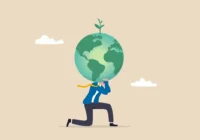Public obsession with celebrity culture diverts attention from tragedies worldwide.
The Internet was set aflame earlier this month — not by Kim Kardashian, but by three days of terror that brought France to a standstill. Seventeen people lost their lives over the actions of the Kouachi brothers and Amedy Coulibaly. World leaders reached out to French President Francois Hollande, while nearly 4 million people took to the streets of France in an expression of unity, mourning and defiance.
Three days earlier in Nigeria, up to 2,000 people were massacred by Boko Haram. Militants from the terrorist organization stormed into the town of Baga on motorbikes and trucks and shot anyone they saw, burning people alive who hid in their homes. Two 10-year-old girls were strapped with explosives that were detonated in market places, just a few days prior. This came on top of 200 schoolgirls who were abducted by Boko Haram in April 2014 and are still missing. But despite the nightmare that has descended on Nigeria, the Internet, in terms of news coverage and social media buzz, barely responded.
There are numerous reasons for this disparity, but most boil down to “convenience” and “practicality,” which are awful words when considering the human lives lost. There is the feasibility of placing journalists in conflict areas; Baga and Boko Haram-controlled areas are highly unsafe. Added to that, while we consider journalism to be a voice for justice in society, it isn’t immune from the interests of investors and the influence of readers. After all, there is a tendency for readers to engage with stories they find easier to understand or ones that are on the news agenda.
Following the coverage of conflicts and terrorist attacks over the last two decades, this disparity is nothing new. Certain countries make the news headlines while others don’t. The Yugoslav, Afghan and Iraqi wars were covered extensively by international news broadcasters, but conflicts in places such as the Democratic Republic of Congo (DRC), Central African Republic, Myanmar or Melanesia have often been left off the radar. In fact, if you walked from Europe to Australia, you would pass through a number of countries that have experienced civil conflict over the last 50 years. The world history of human violence stretches far wider than Korea, Vietnam and Palestine.
While it may seem unfair to burden the average reader with such depths of despair, there are good reasons for encouraging awareness of wars worldwide. Most wars are civil, internal conflicts. They often involve a battle between a ruling army and an armed militia, while in other cases violence spirals out of control and sees civilians killing civilians, as was the case in Rwanda in 1994. Sometimes militias are ideologically motivated, and at other times they are mercenaries — in other words, a “hired army” that kills in exchange for cash. Both armies and militias share a common characteristic of needing finance and weapons.
Nuclear weapons make the headlines. A case in point is India and Pakistan’s conflict over Kashmir, since both countries are nuclear powers. But most civil conflicts are fought on the ground with small arms. A majority of these weapons are produced in economic power houses such as the United States, Russia, Britain and France. While there is legislation such as the Export Control Act 2002 in the United Kingdom, which prevents weapons being sold to nations where it is felt they will be used against civilians, shipments are sometimes made to one country and then illegally transferred to another. A 2007 report by Saferworld found that Britain had exported weapons to 19 of the 20 countries listed as “countries of major concern.” Some of these countries were under arms embargos by the United Nations or European Union or were “zones of major armed conflict.”
Apart from keeping the conversation going about where weapons come from, we need engage with whether a lack of consumer awareness contributes to perpetuating these crimes. For example, so-called “blood diamonds” are mined — often by slaves and sometimes children — in countries such as the Ivory Coast. These diamonds are usually smuggled to other countries to be exported as legitimate diamond trade, meaning that diamonds at the jewelry store could have been dug up by a slave to fund a militia. Conflict in the DRC is funded and perpetuated by the mining of minerals, which then can go on to become consumer electronics.
According to a Global Witness report, an average of one activist has been killed every week since 2002 in Brazil, protecting the Amazon, and numbers are similarly high in Peru. These figures do not include lives lost as a result of the displacement of indigenous people. Public indifference allows the companies involved in logging and oil exploration to remain silently complicit.
Other conflicts are funded by less traceable commodities, such as the poppy fields in Afghanistan or cocaine in Colombia. Public interest in issues gives governments more incentive to engage and nongovernmental organizations more funding to do their work.
If we needed any more reason to raise awareness, the impact of war is immense. Each person that is killed is not only a human and a part of someone’s family, but also a cohort of skills, be they in engineering or medicine — skills that are being eradicated, making it more difficult to piece a war-torn country back together. The poorest regions in the world are often those recovering from wars.
As the conversation turns to the causes of the Paris attacks, hopefully our empathy will extend beyond them. Terror strikes many parts of the world. As we become more interconnected, we should seek to understand what parts of those chains we form and understand that the mere act of becoming interested and concerned can in itself have an impact. Removing Kim Kardashian from your Facebook feed, and replacing her with Amnesty International and quality news organizations is a small step to raise awareness of humanity’s plight.
Fair Observer is a nonprofit organization dedicated to informing and educating global citizens about the critical issues of our time. Please donate to keep us going.
The views expressed in this article are the author’s own and do not necessarily reflect Fair Observer’s editorial policy.
Photo Credit: Goran Bogicevic / Shutterstock.com
Support Fair Observer
We rely on your support for our independence, diversity and quality.
For more than 10 years, Fair Observer has been free, fair and independent. No billionaire owns us, no advertisers control us. We are a reader-supported nonprofit. Unlike many other publications, we keep our content free for readers regardless of where they live or whether they can afford to pay. We have no paywalls and no ads.
In the post-truth era of fake news, echo chambers and filter bubbles, we publish a plurality of perspectives from around the world. Anyone can publish with us, but everyone goes through a rigorous editorial process. So, you get fact-checked, well-reasoned content instead of noise.
We publish 2,500+ voices from 90+ countries. We also conduct education and training programs
on subjects ranging from digital media and journalism to writing and critical thinking. This
doesn’t come cheap. Servers, editors, trainers and web developers cost
money.
Please consider supporting us on a regular basis as a recurring donor or a
sustaining member.
Will you support FO’s journalism?
We rely on your support for our independence, diversity and quality.







Comment